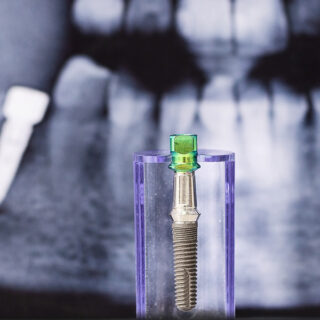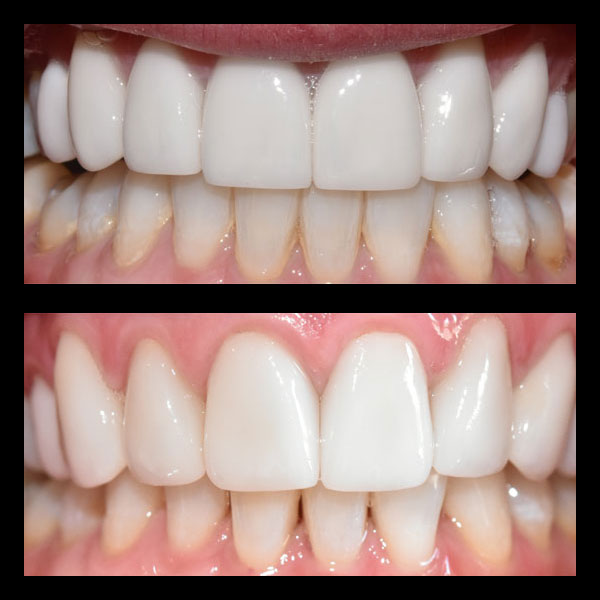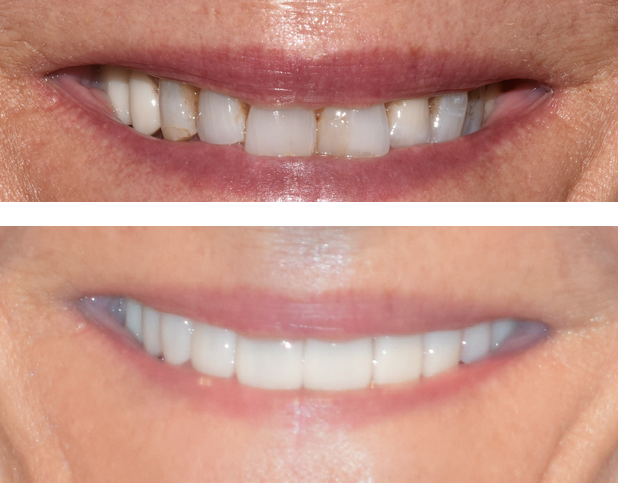 Dental implants have revolutionized restorative dentistry for missing teeth. With an impressive success rate of 95-98%, they’re an ideal treatment choice for most. However, when a dental implant fails, the result can be distressing, with a poor effect on your confidence.
Dental implants have revolutionized restorative dentistry for missing teeth. With an impressive success rate of 95-98%, they’re an ideal treatment choice for most. However, when a dental implant fails, the result can be distressing, with a poor effect on your confidence.
A variety of factors can cause dental implant failure, including inadequate oral hygiene, disease, or bone loss. Recognizing these causes is the first step in preventing and treating the condition.
Understanding Dental Implant Failure
Dental implant failure, while rare, can be categorized into two types: early and late failures.
Early Failures: The Initial Stages
Early failures happen during the first stages of the implant process. This phase is marked by the bone’s attempt to affix to the implant in a process called osseointegration. If this process fails, the implant can become unstable. Infections, known as peri-implantitis, can also arise at this stage due to subpar surgical techniques or post-operative care. Systemic conditions like diabetes or osteoporosis can weaken the bone, hindering the implant’s ability to integrate with the jawbone.
Late Failures: The Long-Term Implications
Failures that manifest several months or even years post-implantation can often be attributed to chronic infections around the implant or bone, particularly from peri-implantitis. This condition is marked by inflamed gums, bone deterioration near the implant, and occasional discharge. If peri-implantitis isn’t promptly and effectively addressed, it can result in the failure of the implant. Effective management hinges on early identification, diagnosis, and appropriate treatment.
Overloading, or excessive pressure on the implant, presents another cause of late failures. This pressure can come from a misaligned bite, clenching or grinding, or poorly made prosthetics. Additionally, poor oral hygiene can contribute to late failures. Even with a successful implant, neglecting daily brushing and flossing or skipping regular dental check-ups can lead to bacterial build-up, inflammation, and, ultimately, implant failure.
Common Signs of Dental Implant Failure
Dental implant failure often begins with subtle signs such as discomfort or pain around the implant area, loosening of the implant, and in some cases, swelling, inflammation or bleeding gums. An unusual taste or odor in your mouth may indicate an infection. Spotting potential issues with dental implants early on can make a significant difference in managing and potentially rectifying the issue. Some of the common signs of dental implant failure to be aware of include:
- Pain or Discomfort: While some pain is expected immediately after the implant procedure, persistent or newly emerging pain weeks or months later can be a sign of failure.
- Swelling or Inflammation: Redness and swelling in the gum tissue surrounding the implant that doesn’t subside after the initial healing phase might indicate an issue.
- Loose or Shifting Implant: One of the most apparent signs is when the implant becomes mobile or starts to shift. A healthy implant is firmly anchored in the bone.
- Difficulty Chewing: If chewing becomes problematic or painful, it might be a sign that the implant isn’t functioning correctly.
- Gum Recession: If the gums begin to recede around the implant site, exposing parts of the implant or metal post, it may be a sign of failure.
- Prolonged Healing: If the implant site doesn’t heal within the expected timeframe (typically a few months), it may indicate that the implant isn’t integrating with the bone as it should.
- Purulent Discharge: The presence of pus around the implant indicates an infection, which can lead to implant failure if not addressed.
- Unpleasant Taste or Odor: A persistent bad taste or odor in the mouth, especially when accompanied by pain or swelling, can suggest an infection.
It’s essential to note that while these signs might indicate implant failure, they can also be indicative of other dental or systemic issues. If you experience any of these symptoms with your implant, consult your dentist immediately for a thorough evaluation.
How to Manage Failed Dental Implants
Addressing a failed implant can be straightforward. The first step is identifying the cause. Determining whether the failure stems from infection, poor bone support, or overloading is crucial in deciding the appropriate corrective measures.
A detailed examination is critical in identifying the root cause. The timing of the failure also plays a crucial role. Early failures might indicate different causes than late failures. Once the cause is identified, the next step is timely intervention.
Early Intervention
Early detection of implant failure can mitigate potential damage. For early failures, the common course of action is to remove the implant, allow healing, and consider a new implant. This process may involve bone grafting to ensure adequate bone support for the new implant. The sooner the failure is detected and addressed, the better the chances for a successful replacement.
For late failures, especially those caused by peri-implantitis, the treatment can vary. It can range from non-surgical methods like deep cleaning and antibiotics to surgical interventions like bone grafts and guided tissue regeneration.
The treatment plan, regardless of the failure type, usually includes a series of steps:
- Cleaning the area: A professional cleaning or debridement often initiates the management of a failed implant, helping remove bacteria and infection.
- Antibiotic therapy: Antibiotics can help fight off any existing infection.
- Surgical intervention: In some instances, surgical intervention involving bone grafts or guided tissue regeneration may be necessary.
- Implant replacement: A new implant can replace the failed one once the site has adequately healed.
With a systematic approach and a competent dental professional, addressing a failed implant can be manageable. Each step in the process aims to ensure the best possible outcome for your oral health.
Alternative Options to Treat Failed Dental Implants
If a dental implant fails, there are several options available to address the situation and work towards restoring oral function and aesthetics.
Implant Removal and Bone Grafting: If there’s not enough bone left or if there’s significant bone loss due to the failing implant, the dentist or oral surgeon might remove the implant and perform bone grafting to reinforce the jaw with bone material. This creates a solid foundation for future implant placement.
Re-implantation: After removing a failed implant and allowing the area to heal sufficiently (which might involve bone grafting), another implant can be placed. There will be a longer period of healing time required before replacement abutment can be placed. This is often done when the cause of the initial failure can be addressed.
Dental Bridges: If re-implantation isn’t an option or if a patient prefers not to go through another implant procedure, a dental bridge can serve as an alternative. A dental bridge effectively restores the function and appearance of missing teeth, while also preventing adjacent teeth from shifting and compromising dental alignment. Additionally, it offers a stable, non-removable solution, effectively restoring the function and appearance of missing teeth.
Partial or Full Dentures: Partial or full dentures provide a removable solution to replace missing teeth, improving facial aesthetics and speech clarity. They offer a cost-effective way to restore function. They are also a less invasive option, especially for individuals who aren’t candidates for another implant or bridge.
Proactive Prevention: The Key to Dental Implant Success
Dental implants need special care to thrive. Being proactive can lead to more favorable outcomes with dental implants. After all, prevention is often the best solution. Diligent aftercare and maintenance can enhance your implant’s success.
The Importance of Dental Implant Aftercare
The first few weeks following your dental implant procedure are crucial for your implant to fuse with the bone. A well-planned aftercare routine ensures smooth healing and improves the chances of a successful implant.
Aftercare typically involves maintaining oral hygiene to prevent infection, following dietary restrictions to protect the implant site, and managing pain or discomfort with prescribed medication. Swelling or bruising may be common initially, but they will subside with time and proper care. Avoid strenuous physical activity to prevent unnecessary bleeding or swelling.
Keeping Dental Implants in Good Shape
Even after your dental implant heals, regular cleaning and maintenance are necessary, much like your natural teeth. This ongoing care helps maintain oral hygiene, prevent diseases, and ensure your implant’s longevity and effectiveness.
Regular brushing and flossing, using an antibacterial mouthwash to prevent plaque formation, and avoiding harmful habits like smoking or excessive alcohol consumption are all part of the maintenance routine. Pay attention to any changes or discomfort around your implant. Detecting issues early can prevent potential complications.
Maintaining dental implants effectively necessitates consistent dental examinations. Your dentist will monitor your implant’s condition and perform professional cleanings, ensuring your implant’s health and functionality. Regular check-ups also provide an opportunity to address any concerns or questions about your dental health.
Working Together for Dental Implant Success
At Incredible Smiles, we recognize that your smile is a mirror to your happiness, health, and confidence. While facing dental implant complications might feel daunting, our dedicated team views it as an opportunity to rejuvenate your beautiful smile.
If you have any questions or concerns about your dental implants or any other dental needs, we’re here to assist. Dr. Uppal, along with our entire team, is committed to offering guidance, proficiency, and comfort. Every treatment plan we devise at Incredible Smiles is tailored to your specific dental health and cosmetic preferences.
Connect with Incredible Smiles for a complimentary consultation today!








